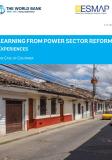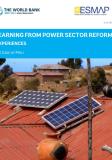Publications
The work included in this report is part of the efforts undertaken under the Europe and Central Asia Sustainable Cities Initiative (ECA SCI). The objective of the World Bank’s Europe and Central Asia (ECA) Sustainable Cities Initiative is to identify the main drivers of energy consumption and carbon emissions and take policy and institutional measures, alongside critical investments, to proactively deal with these sustainability challenges into the future.
The ECA Sustainable Cities Initiative or SCI is designed to help cities and national governments tackle this agenda. It involves a four stage process within the SCI Framework: (i) Orientation and Awareness Raising; (ii) City-level Diagnostics; (iii) Policy and Institutional Adjustments and preparation of Sustainability Action Plans; and (iv) Financing of Sustainable Investments.
This report is an outcome of the diagnostics referred to above as “stage two” of the SCI Framework. Gaziantep is one of the fastest growing cities in the world, and one of the most dynamic urban economies in Turkey. It serves as Turkey’s gateway to the Middle East, and is one of the country’s most important trade links south and east. This City is noted for a number of initiatives that already reflect city officials’ awareness of energy efficiency and carbon emission challenges and some of the solutions. So the main purpose of this analysis was to provide a framework to understand critical areas where energy efficiency gains are needed and possible through a variety of interventions.
TRACE was used for the City of Gaziantep as one of the first global pilots to yield recommendations for Energy Efficiency in Gaziantep. Sponsorship for this work came in part from the Energy Efficient Cities Initiative (EECI) of the Energy Sector Management Assistance Program (ESMAP), hosted at the World Bank.



